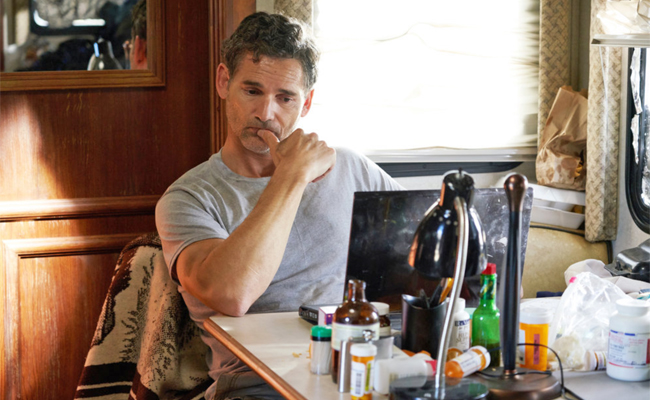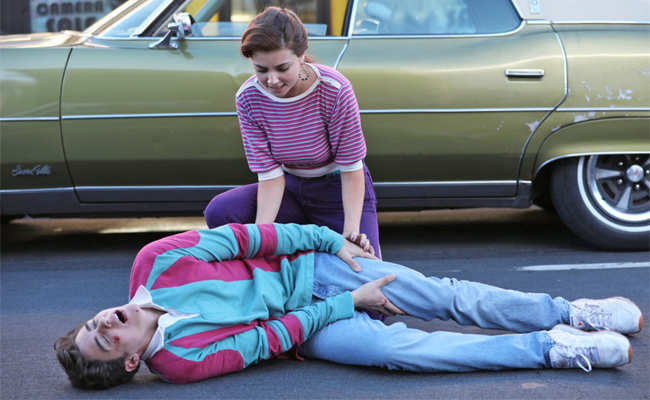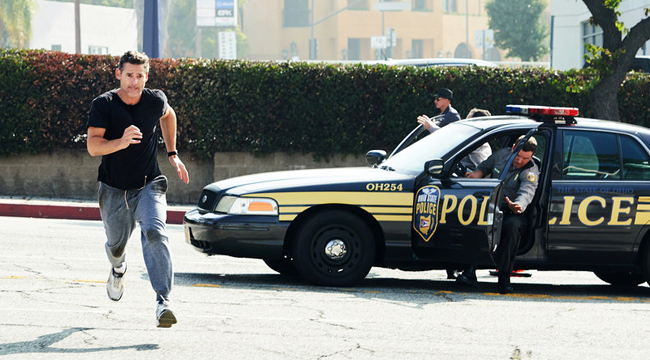
(Spoilers for Dirty John, both the podcast and the TV series, will definitely be found below.)
Bravo’s Dirty John series doesn’t 100% match up to the true-crime podcast (from Christopher Goffard of the LA Times), and that’s to be expected, given a longer runtime and the visual medium that encourages more creative license. Before the TV show launched, star Eric Bana promised Uproxx a more unsettling experience, and Bana’s predictions are coming true in the latter half of the season. When the series finale arrives, it’ll be time to talk about the show’s take on abusive relationships, but for now, the Bravo series is making John more of a well-rounded villain (which does present drawbacks), one with a past and less of a mysterious entity who seemingly emerged fully-formed to forge a path of destruction. In doing so, Bravo illuminates how John was able to deftly maneuver within a system that was no match for his manipulative “talents.”
What’s also scary is the paradox that Bravo’s extended narrative presents. By detailing more of John’s past, he doesn’t become scarier simply because he’s portrayed as even more monstrous than his real-life counterpart. Instead, he grows slightly humanized because we see (with graphic specificity) how he was groomed to be bad. Yet the most terrifying by-product is how the legal U.S. system made it more of pain in the butt to incarcerate John, long-term, and shut him down. (After all, dozens of restraining orders and several felony convictions can’t be wrong.) We see this during episodes 5 (“Lord High Executioner”) and 6 (“One Shoe”) — after Debra (Connie Britton) has tried once to flee from her husband’s manipulative, grifting, and drug-addicted behavior. Debra wants to believe that John wants to be a better person, and there are arguments to be made about how quickly she’s willing to forgive his misdeeds, but John’s been conning people for decades already. He’s a pro.
With Debra, John truly achieves the perfect psychopathic storm by zeroing in on her history and vulnerabilities. Yet I do struggle with whether the “cautionary tale” aspect of the podcast rings true, thanks to pulpy scenes like the next one. In “Lord High Executioner,” we see the childhood roots of John’s grifting in visceral detail. This history is very briefly touched upon in the podcast — John’s mafia-wannabe father urged him to stuff glass into a restaurant taco and dash into the street in front of a moving vehicle to collect insurance money — but it almost feels like Goffard mentions these acts in passing, to de-emphasize them. Whereas on Bravo’s series, we actually see this happen, along with the aftereffects. The acting isn’t stellar, and John’s dad throws Goodfellas vibes that play as darkly comedic rather than terrifying, but still, Bravo takes great pains to flesh out a broken-boned young John while he’s executing a scam.

If viewers can move past the absurdity and the outlandishless of this scene, they’ll be as appalled as John’s sister, Denise, that a father would instruct his son to possibly die to collect some quick dough. Later, we learn from one of John’s groomsmen that he embraced this lifestyle, often intentionally crashing head-on into people driving away from bars or throwing himself on top of car hoods in broad daylight, only to demand cash on the spot for these people to avoid insurance claims. We’re not entirely certain if John’s opiate addiction begins as a result of his childhood car “accident,” but the seed is planted to consider John to also be a victim of sorts while he’s carrying out a lifetime of malignancy. And that leads to some sketchy territory that was (purposely?) downplayed by Goffard during his podcast.
And so, John’s evil is presented as a paternal creation, while Bana convincingly whiplashes back and forth between acting charming and nefarious. We also see John take the additional step of killing his comatose father (and that isn’t in the podcast), and it’s not clear whether he actually wanted to take his dad out or was simply preying upon Denise’s emotions in pursuit of future scamming opportunities. The series goes much further than the podcast to show how John then terrorized his sister despite her efforts to help him start a legitimate life. It’s also troubling that John’s “pseudo gangster” dad gets pinned with much of the responsibility for his son’s future actions. Still, this is useful to diffuse some of Debra’s responsibility in repeatedly falling for John’s con-man act.
The “One Shoe” episode relentlessly weaves John’s present and past to further detail his pattern of legal harassment while also evading prosecution for his own crimes. He threatens to rough up, sue, and file bar complaints against the lawyer who wants a post-nup for Debra, and we learn more about the extensive history of complaints about him regarding stolen drugs (which left patients screaming in agony) across several states where he worked, not as a doctor (as he claimed), but a nurse certified in pain management. Throughout, he was so adept at making people’s lives hell that people were simply relieved when he moved onto other targets. “A lot of people knew something was up,” states a detective character. “But a lot of people decided that it wasn’t their problem.”

Thanks to the efforts of that detective (who worked closely with John’s ex-wife, Tanya), the villain does go to prison. However, concurrent jail sentences, “good” behavior, and a multitude of other factors lead to John being quickly released, and he goes hunting for new prey. In real life, he met Debra only days later (though this takes longer in the series), and the detective calls Newport Beach to urge that John should be on police radars, but that warning clearly wasn’t taken seriously. From here, the series begins to build toward a violent climax while Debra begins to plot another attempted exit. With only two episodes left, John threatens to hit Debra and “make sure you never get up again.” This threat, coupled with the graphic portrayal of his history, leaves little doubt that this series won’t end without bloodshed.






